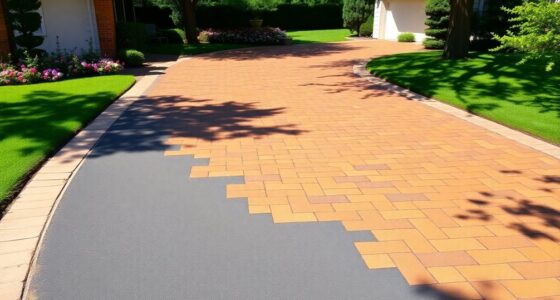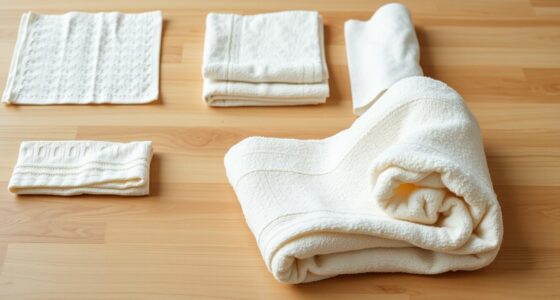Have you ever noticed a stubborn stain on your couch and felt unsure what to do? You’re not by yourself. Many of us have faced the challenge of keeping our microfiber couches looking good. Despite dirt and accidents that happen. But, you can handle it. With some knowledge and the right tools, cleaning your couch turns from a daunting task into a rewarding one. This guide will show you the best ways to clean your microfiber couch. You’ll learn how to remove stains, odors, and more. Your couch will keep being a welcoming part of your home.
Key Takeaways
- Microfiber fabrics are prone to watermarks; choose cleaning methods wisely.
- Regular vacuuming is essential, especially in homes with pets, to prevent dirt buildup.
- Follow the specific cleaning codes for your couch to avoid damaging the fabric.
- Spot cleaning with rubbing alcohol can be highly effective for minor stains.
- Seasonal thorough cleaning helps maintain the appearance and longevity of your couch.
- Use a simple solution of water and liquid dish soap for “W” coded couches.
- Optional: sprinkle baking soda overnight to absorb odors for fresh results.
Introduction to Microfiber Couches
Microfiber couches are a fantastic addition to any home, offering style and practicality. They have a soft texture and an elegant look that boosts your living space. These couches also bring the advantages of microfiber furniture to the forefront. They’re made from synthetic fibers, making them super durable. This is why they’re great for homes with kids and pets.
The microfiber fabric benefits are impressive, especially its superior stain resistance. This feature allows you to relax on your couch without fretting over spills or messes. If treated right, microfiber couches can last up to 50% longer than other fabric sofas. To keep them in tip-top shape, vacuum them regularly, ideally when you clean your floors.
A deep clean every season is advised to keep your couch in perfect condition, especially if it’s frequently used. Addressing spills quickly prevents them from damaging the fabric. This way, cleaning up is easy, and your couch’s lifespan is extended.
Microfiber couches come with different cleaning codes on their labels. These codes guide you on the best cleaning methods. Knowing your couch’s cleaning code means you can keep it looking its best for many years.
Understanding Microfiber Fabric
Microfiber is a synthetic material, usually made of polyester blends. These blends give microfiber fabric characteristics like great strength and durability. Its tightly woven fibers are tough. This makes it perfect for busy furniture like sofas. Knowing the types of microfiber helps in picking the right cleaning methods for your couch.
Microfiber fabrics have care tags that show how to clean them with specific codes. These codes include:
| Code | Cleaning Method |
|---|---|
| W | Water-based clean only |
| S | Solvent-based clean only |
| S-W | Solvent or water-based clean |
| X | Dry clean only |
Cleaning microfiber the right way is key since it draws in oils. This can make high-touch areas look dirty. Regular cleaning microfiber keeps it looking good and lasting long. For “W” or “S-W” couches, try vinegar and water for stains. Warm water and mild dish soap work well for “W” fabrics. Use rubbing alcohol for grease on “S” furniture.
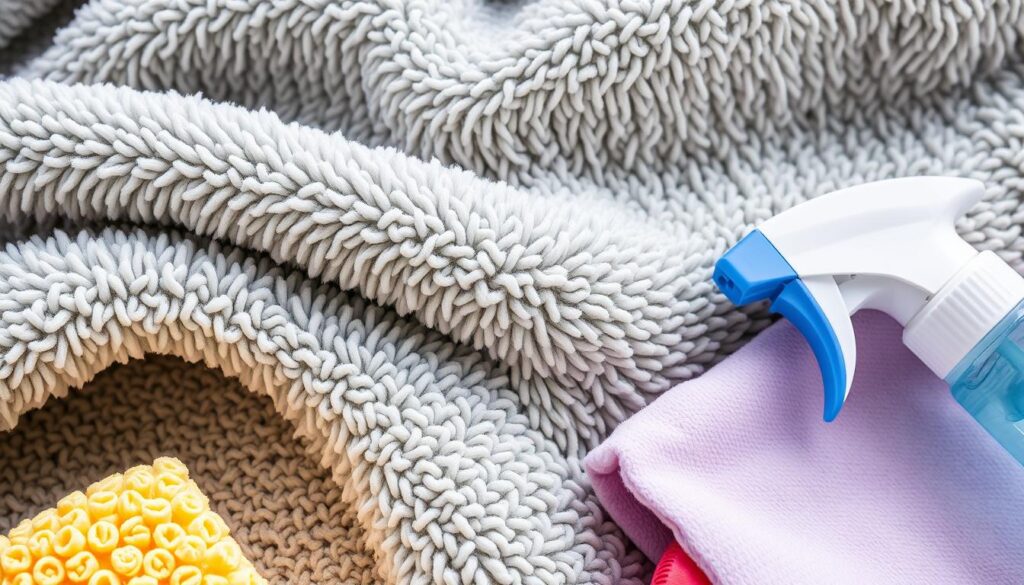
Cleaning well is crucial. It not only makes your microfiber couch look and feel better but also lasts longer. Always test cleaners on a small spot first to prevent color damage. With the right care, your microfiber furniture will stay nice for many years.
Why Choose Microfiber for Your Couch?
Choosing microfiber for your couch has many reasons to choose microfiber that stand out. Microfiber is made of ultra-fine threads, thinner than silk, offering softness and strength. This special makeup not only makes your couch more comfortable but also helps it last longer.

One top advantage of microfiber upholstery is its amazing ability to resist stains. This is perfect for homes with kids and pets. Small spills usually don’t soak in, making them easy to clean up. To keep it looking good, simply vacuum regularly and flip the cushions to wear evenly.
- Microfiber furniture can often be cleaned at home, using simple supplies like rubbing alcohol or mild dish soap.
- Spot-cleaning can be efficiently performed with a “barely damp” cloth and a drop of castile soap.
- Using baking soda or corn starch effectively absorbs grease, making it a practical option for tackling difficult messes.
The fabric’s thickness acts as extra protection, a bonus for pet owners. With the right care, microfiber couches last much longer than others, sometimes 50% more. Caring for them well, and using a fabric protector like Scotchguard, makes your upholstery more durable and look better.
In short, microfiber’s easy care and strong nature make it a top choice for anyone wanting both beauty and usefulness in their couch.
Benefits of Regular Cleaning
Cleaning your microfiber couch regularly is crucial. It keeps the couch looking good and makes it last longer. If you ignore cleaning, dirt will gather, especially in homes with kids or pets.
Microfiber couches stand up well to daily use. They resist stains and fading. When something spills, act fast to avoid damage. The fabric’s design usually gives you time to clean spills before they set.

A basic cleaning routine makes a big difference. It involves regular vacuuming and treating spots when they happen. Gently testing cleaners on small areas first helps avoid damage. This way, many people manage to clean spills quickly, thanks to the fabric’s fast-drying feature.
Keeping your couch clean also saves money. Hiring professionals for a deep clean every so often keeps your couch looking new. Regular cleaning means you avoid spending on repairs or buying a new couch.
| Cleaning Method | Frequency | Benefits |
|---|---|---|
| DIY Cleaning | Every 3 to 12 months | Cost-effective, immediate stain removal |
| Professional Cleaning | Every 12 to 18 months | Deep cleaning, specialized products |
| Spot Cleaning | As needed | Prevents permanent stains |
| Regular Vacuuming | Weekly | Removes dust and dirt buildup |
In conclusion, cleaning your couch has many perks. It looks better, stays clean, and lasts longer. Regular cleaning is key to a beautiful couch and a healthier home.
Identifying Your Couch’s Cleaning Code
Knowing your microfiber couch’s cleaning code is key to keeping it looking great. Most come with a tag showing how to clean them properly. By following these codes, you can avoid damaging your couch while keeping it in top shape.
Understanding Cleaning Codes W, S, W-S, and X
The codes tell you which cleaners are safe to use:
| Cleaning Code | Description |
|---|---|
| W | Use water-based cleaning solutions. |
| S | Requires solvent-based cleaners only. |
| W-S | Allows for either water or solvent cleaners. |
| X | Only vacuuming is permitted, no cleaning solutions. |
Vacuum your microfiber couch regularly to keep it clean. Spot clean stains right away to avoid lasting damage. Consider a deep clean every few months, based on how much you use your couch. For tough stains, a professional cleaner like COIT could be your best choice.
Learning about microfiber cleaning codes helps you take good care of your couch. This way, it will look beautiful for years.
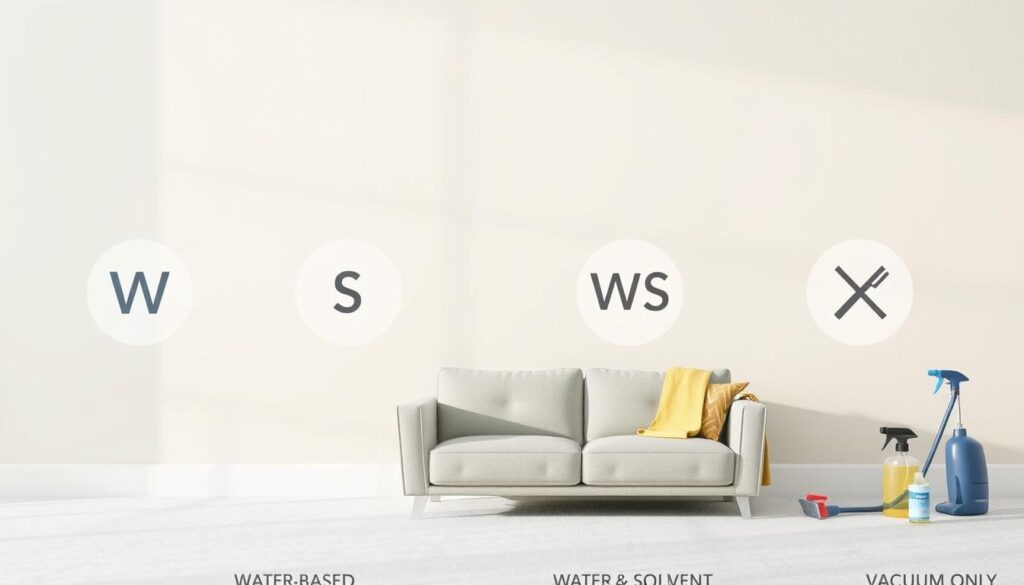
Preparation for Cleaning Your Microfiber Couch
Before cleaning your couch, it’s important to have the correct tools ready. You also need to know about safety. With the right supplies and info, cleaning microfiber couches is easy. Follow these tips for a good cleaning job.
Essential Cleaning Supplies
- Vacuum with upholstery attachment
- Soft-bristled brushes
- Microfiber cloths
- Dish soap (for “W” cleaning codes)
- Isopropyl alcohol (for “S” cleaning codes)
- Baking soda for deodorizing
Make sure you have these cleaning items to remove dirt and stains well. Regularly vacuuming is key. It keeps your couch looking good and stops dust and pet hair from building up.
Safety Precautions to Consider
When cleaning, having a safe space is key. Check your cleaning products for allergens. Make sure they’re safe for your couch’s material. Good airflow is also important, especially when using cleaners based on solvents. Open windows to let fresh air in and keep harmful fumes out.
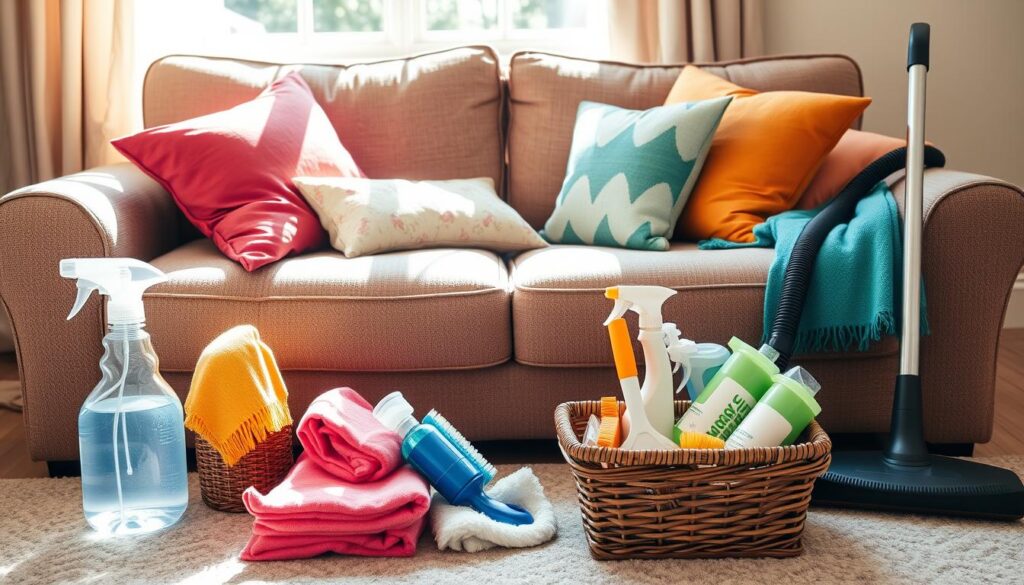
Think about how your couch will dry. Don’t use it until it’s fully dry. This could take 2 to 8 hours, depending on the air’s moisture. Stay away from heaters, as they could harm the fabric. If you prepare and take the right safety steps, your microfiber couch will stay nice for a long time.
Best Way to Clean Microfiber Couch: Water-Based Method
Making your microfiber couch look new is easy with water-based cleaning. It’s a soft yet efficient way to keep up with everyday messes and unexpected spills. Here’s how you do it right.
Step-by-Step Instructions for Water-Based Cleaning
- Gather your supplies: a mild dish soap, warm water, and a clean sponge or soft brush.
- Create a solution by mixing a small amount of dish soap in a bowl of warm water.
- Dip the sponge or brush into the soapy mixture. Avoid oversaturation to keep moisture at bay.
- Gently scrub the couch in sections, allowing each area to dry before moving on to the next.
- After cleaning, use a clean damp sponge to rinse off any soap residue.
- Lightly fluff the fabric with a soft-bristled brush to restore its texture.
Tips for Effective Spot Cleaning
- For best results, treat stains as soon as they occur. Always blot gently to avoid spreading the stain.
- Work from the outer edge of the stain toward the center, minimizing the risk of further damage.
- Employ a gentle touch while scrubbing, as harsh pressure may impact the fabric’s integrity.
- Always use light-colored cloths for blotting to prevent color transfer onto the microfiber.
- After cleaning, you may choose to use a hair dryer on a low setting to help dry the area more quickly.
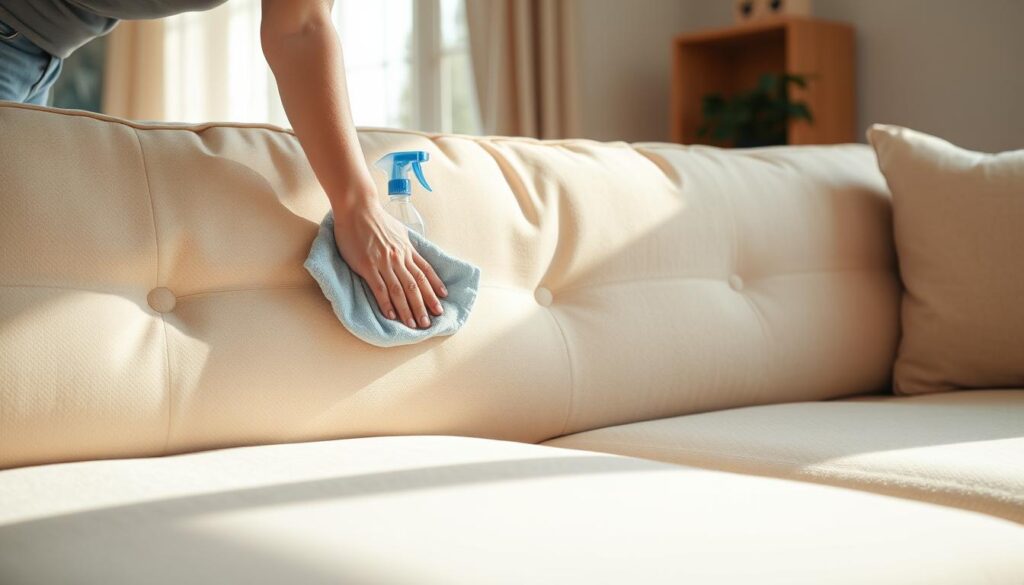
By following these steps, your microfiber couch will not only look fantastic but last longer too. A water-based method keeps your couch looking sharp. It also makes cleaning safe and effective.
Best Way to Clean Microfiber Couch: Solvent-Based Method
Knowing when to use the solvent cleaning method for microfiber couches is key. It works well for couches labeled with an “S” for cleaning. Isopropyl alcohol is a top choice here. It lifts stains well and lowers the risk of water damage.
When to Use Solvent-Based Cleaners
Use solvent-based cleaners for grease and oil stains. They outperform water-based cleaners on tough stains. About 70% of household stains, including odors, can be tackled this way.
Detailed Guide for Solvent Cleaning
To use the solvent cleaning method on microfiber couches, follow these steps:
- Prep the Area: Start by vacuuming the couch to get rid of loose dirt. This is important for top results.
- Choose Your Cleaner: Pick a solvent cleaner, like isopropyl alcohol. Make sure it’s about 90% for best effect.
- Application: Spray the solvent lightly on stains, but don’t soak it. Too much liquid can leave marks.
- Let it Sit: Leave the cleaner on for 20 to 30 minutes to work on the stain.
- Blot the Stain: Use a clean cloth to dab the stain away. Keep going until it looks better.
- Test First: Always try the cleaner on a hidden spot to avoid damage.
These steps can help you remove tough stains and keep your microfiber couch looking new.
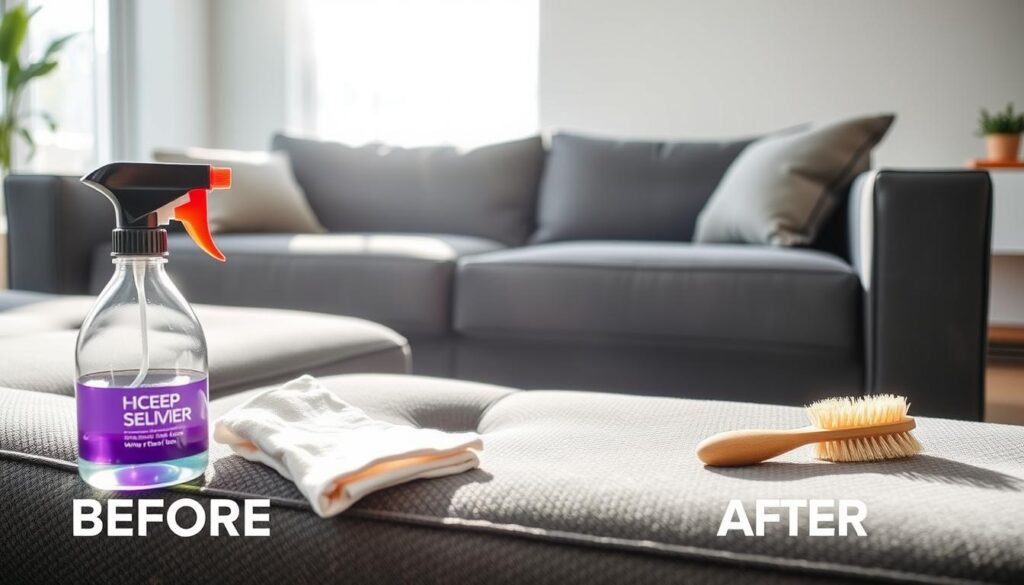
Common Stain Removal Techniques
Stains can make your microfiber couch look bad. Knowing how to remove them keeps your couch looking good and lasting longer. Some common stains have specific ways to be cleaned, making your upholstery look cleaner.
Removing Grease Stains
If you get a grease stain, act fast. Put cornstarch or baby powder on the stain right away. Wait 15-20 minutes so it can soak up the grease, then vacuum it up. You can use rubbing alcohol next to clean even more. This method gets rid of about 75% of tough stains on microfiber furniture.
Eliminating Pet Urine and Odors
Quick treatment is key for pet urine. Mix 1 cup of white vinegar with 1 cup of water to get rid of smells and stains. Put this mix on the stain, then dab with paper towels. Add baking soda to take care of any left moisture or smells. Leaving the baking soda on overnight makes it work better. Using products to control smells regularly helps keep your couch smelling nice.
Handling Chewing Gum and Other Sticky Messes
To remove chewing gum, freeze the spot with ice cubes. This makes it easy to scrape off the gum without ruining the fabric. This technique is great for cleaning sticky stuff while keeping your couch in good shape.

Regular Maintenance Tips
Keeping your microfiber couch in good shape is key to making it last and look fresh. Following simple maintenance tips keeps your couch nice and comfy. This way, you won’t have to clean it deeply, saving you hassle.
Vacuuming and Brushing Techniques
Vacuuming your couch every week is crucial. Make sure to clean the seams and hidden spots to get rid of dust and dirt. This keeps the fabric in good condition. Add a soft brush to your routine to improve the texture and clean better.
- Use a vacuum cleaner with a brush attachment to tackle stubborn dirt.
- Brush the microfiber in one direction to maintain the fabric’s sheen.
- Avoid using a vacuum with a beater bar; it can damage the fibers.
Using these cleaning tips will make your couch look better and last longer. Always focus on small details for the best care of your microfiber.

| Maintenance Task | Frequency | Tools Needed |
|---|---|---|
| Vacuuming | Weekly | Vacuum cleaner with brush attachment |
| Brushing | Weekly | Soft bristle brush |
| Spot cleaning | As needed | Rubbing alcohol, soft cloth |
| Washing removable covers | Every 3-6 months | Washing machine, mild detergent |
Protecting Your Couch After Cleaning
Keeping your microfiber couch in top shape does more than just make it look good. It also increases how long it lasts. After cleaning, it’s important to protect the couch to keep it looking its best.
Using Fabric Protectors
Using fabric protectors, like Scotchgard, is a great way to keep stains away. These protectors stop liquids from soaking into the fabric. Make sure to follow the instructions on the label carefully. Always test the product on a small area first to avoid any damage.
Long-Term Care Suggestions
To keep your couch looking great, set up a regular care routine. Vacuuming often gets rid of dust and dirt. If any spills happen, clean them up right away to avoid stains. Think about getting covers to protect the couch from daily use.

Conclusion
Understanding the fabric of your microfiber couch is key to its care and longevity. Regular cleaning like weekly vacuuming and deep cleans are crucial. They help avoid dirt and allergens, making your home healthier for everyone.
Make sure to use the right cleaning method, as shown on your couch’s tag. This could be water-based solutions or solvent cleaners. Handling spills quickly and using gentle methods will keep your couch looking great.
By following the steps in this guide, you can keep your microfiber couch looking good for a long time. With the correct knowledge and tools, cleaning your couch becomes easy and rewarding!


